Aerospace and defense company Kratos (NASDAQSG:KTOS) announced better-than-expected results in Q2 CY2024, with revenue up 16.8% year on year to $300.1 million. On the other hand, next quarter's revenue guidance of $272.5 million was less impressive, coming in 6.7% below analysts' estimates. It made a non-GAAP profit of $0.14 per share, improving from its profit of $0.09 per share in the same quarter last year.
Is now the time to buy Kratos? Find out by accessing our full research report, it's free.
Kratos (KTOS) Q2 CY2024 Highlights:
- Revenue: $300.1 million vs analyst estimates of $276.2 million (8.7% beat)
- EPS (non-GAAP): $0.14 vs analyst estimates of $0.08 ($0.06 beat)
- Revenue Guidance for Q3 CY2024 is $272.5 million at the midpoint, below analyst estimates of $292.1 million
- The company reconfirmed its revenue guidance for the full year of $1.14 billion at the midpoint
- EBITDA guidance for the full year is $104.5 million at the midpoint, below analyst estimates of $108.3 million
- Gross Margin (GAAP): 25.7%, in line with the same quarter last year
- EBITDA Margin: 10%, up from 8.4% in the same quarter last year
- Free Cash Flow was -$15.4 million compared to -$15.9 million in the previous quarter
- Organic Revenue rose 16.7% year on year (12.3% in the same quarter last year)
- Market Capitalization: $3.06 billion
Eric DeMarco, Kratos’ President and CEO, said, “Kratos’ position as a leading defense technology company is reflected in our second quarter and six month year to date organic growth rates of 16.7% and 18.1%, respectively. We are growing the business, while also increasing our profitability, with second quarter and year to date EBITDA growth of approximately 38.4% and 44.8%, over Q2 and six months year to date 2023, respectively. Additionally, we are making significant investments in facilities, manufacturing capacity, infrastructure, research, development and more, to address growing U.S. National Security needs and certain large, new program and system opportunities for Kratos, including as reflected in our record opportunity pipeline of $12.0 billion.”
Established with a commitment to supporting national security, Kratos (NASDAQGS:KTOS) is a provider of advanced engineering, technology, and security solutions tailored for critical national security applications.
Defense Contractors
Defense contractors typically require technical expertise and government clearance. Companies in this sector can also enjoy long-term contracts with government bodies, leading to more predictable revenues. Combined, these factors create high barriers to entry and can lead to limited competition. Lately, geopolitical tensions–whether it be Russia’s invasion of Ukraine or China’s aggression towards Taiwan–highlight the need for defense spending. On the other hand, demand for these products can ebb and flow with defense budgets and even who is president, as different administrations can have vastly different ideas of how to allocate federal funds.
Sales Growth
A company’s long-term performance can indicate its business quality. Any business can put up a good quarter or two, but many enduring ones tend to grow for years. Luckily, Kratos's sales grew at an impressive 10.9% compounded annual growth rate over the last five years. This shows it expanded quickly, a useful starting point for our analysis. 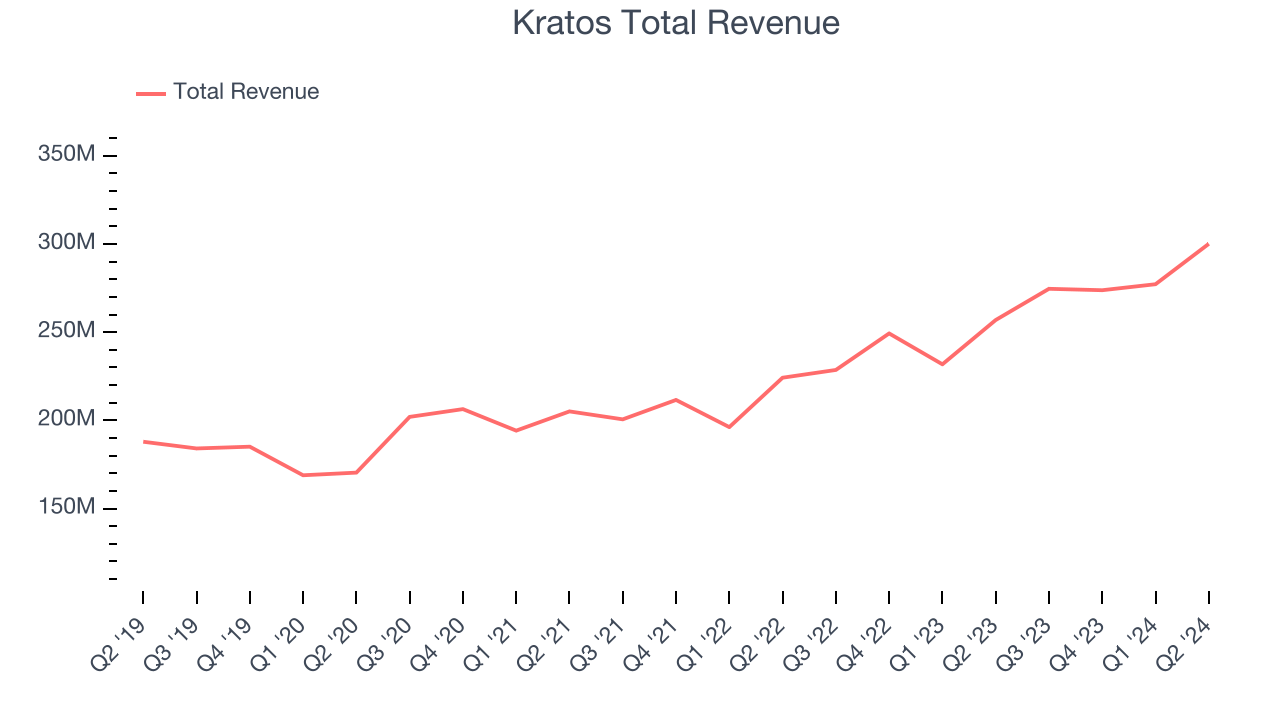
Long-term growth is the most important, but within industrials, a half-decade historical view may miss new industry trends or demand cycles. Kratos's annualized revenue growth of 16.3% over the last two years is above its five-year trend, suggesting its demand was strong and recently accelerated.
We can better understand the company's sales dynamics by analyzing its organic revenue, which strips out one-time events like acquisitions and currency fluctuations because they don't accurately reflect its fundamentals. Over the last two years, Kratos's organic revenue averaged 11.7% year-on-year growth. Because this number is lower than its normal revenue growth, we can see that some mixture of acquisitions and foreign exchange rates boosted its headline performance. 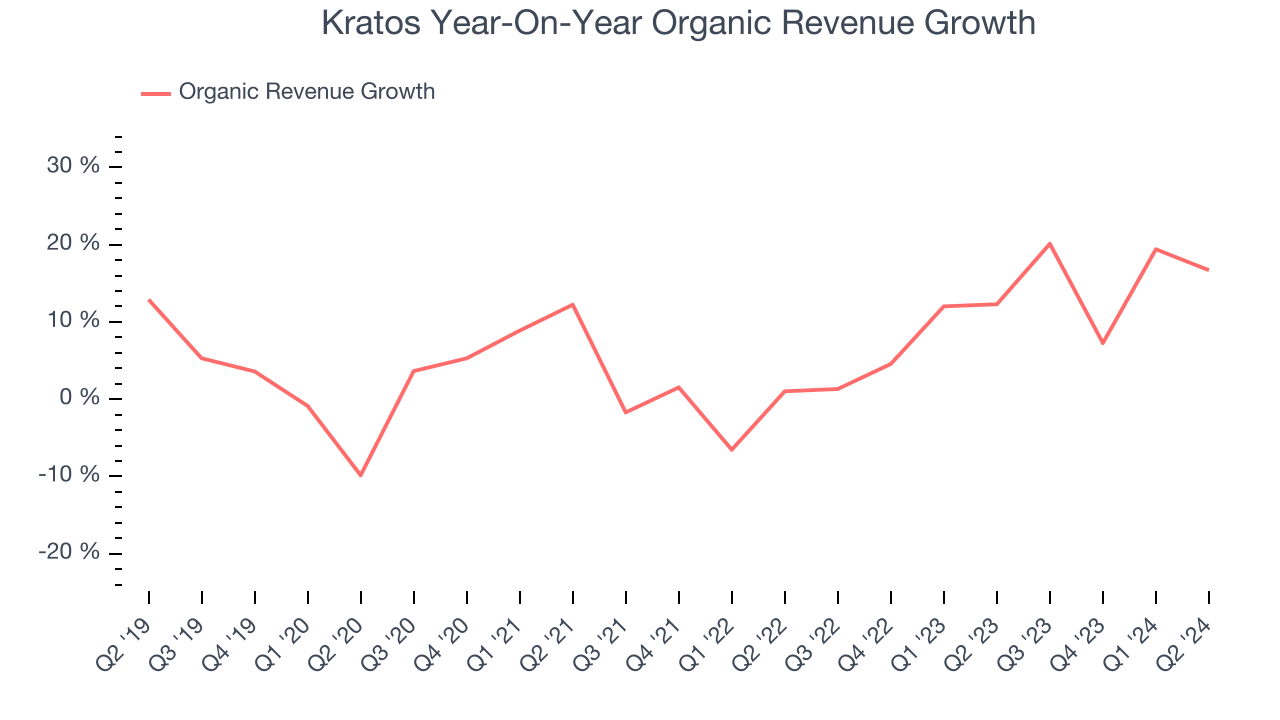
This quarter, Kratos reported robust year-on-year revenue growth of 16.8%, and its $300.1 million of revenue exceeded Wall Street's estimates by 8.7%. For next quarter, the company is guiding for flat year on year revenue of $272.5 million, slowing from the 20.1% year-on-year increase it recorded in the same quarter last year. Looking ahead, Wall Street expects sales to grow 7.3% over the next 12 months, a deceleration from this quarter.
Unless you’ve been living under a rock, it should be obvious by now that generative AI is going to have a huge impact on how large corporations do business. While Nvidia and AMD are trading close to all-time highs, we prefer a lesser-known (but still profitable) semiconductor stock benefitting from the rise of AI. Click here to access our free report on our favorite semiconductor growth story.
Operating Margin
Operating margin is one of the best measures of profitability because it tells us how much money a company takes home after procuring and manufacturing its products, marketing and selling them, and, most importantly, keeping them relevant through research and development.
Kratos was profitable over the last five years but held back by its large expense base. It demonstrated lousy profitability for an industrials business, producing an average operating margin of 2.8%.
Analyzing the trend in its profitability, Kratos's annual operating margin might have seen some fluctuations but has generally stayed the same over the last five years, meaning it will take a fundamental shift in the business to change.
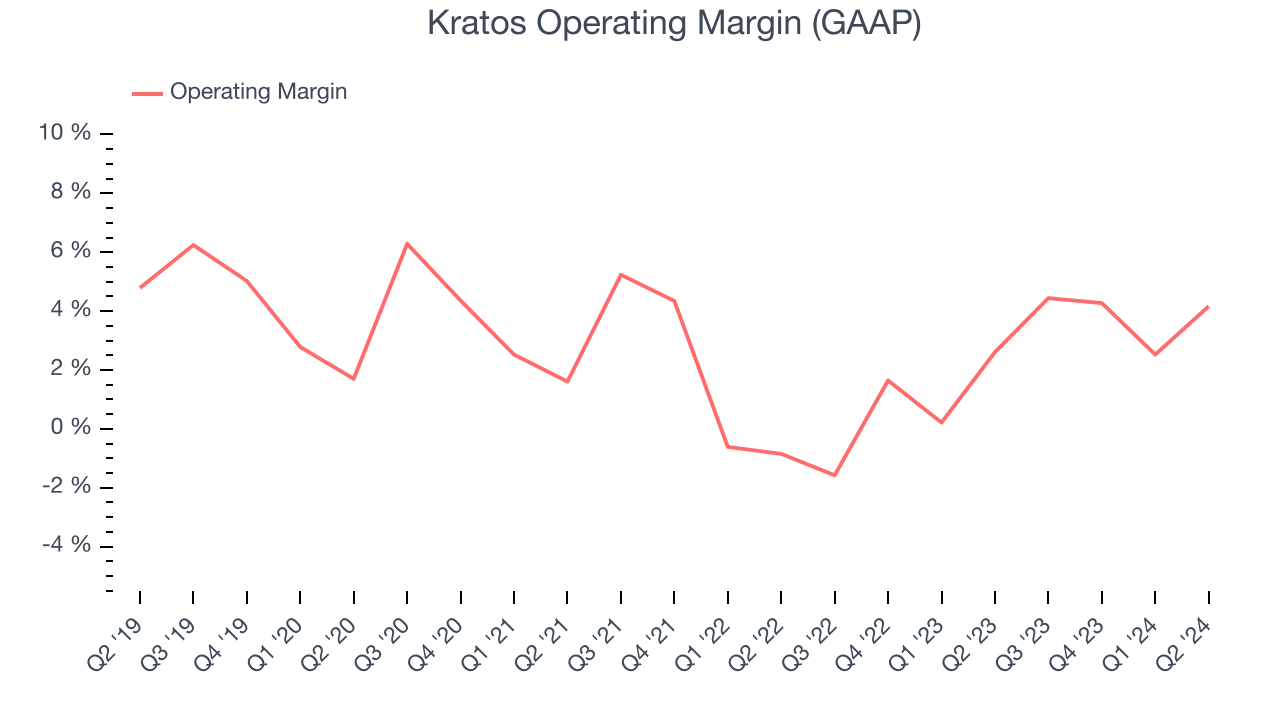
In Q2, Kratos generated an operating profit margin of 4.2%, up 1.6 percentage points year on year. This increase was a welcome development and shows it was recently more efficient because its expenses grew slower than its revenue.
EPS
We track the long-term growth in earnings per share (EPS) for the same reason as long-term revenue growth. Compared to revenue, however, EPS highlights whether a company's growth was profitable.
Kratos's EPS grew at an unimpressive 4.7% compounded annual growth rate over the last five years, lower than its 10.9% annualized revenue growth. However, its operating margin didn't change during this timeframe, telling us non-fundamental factors affected its ultimate earnings.
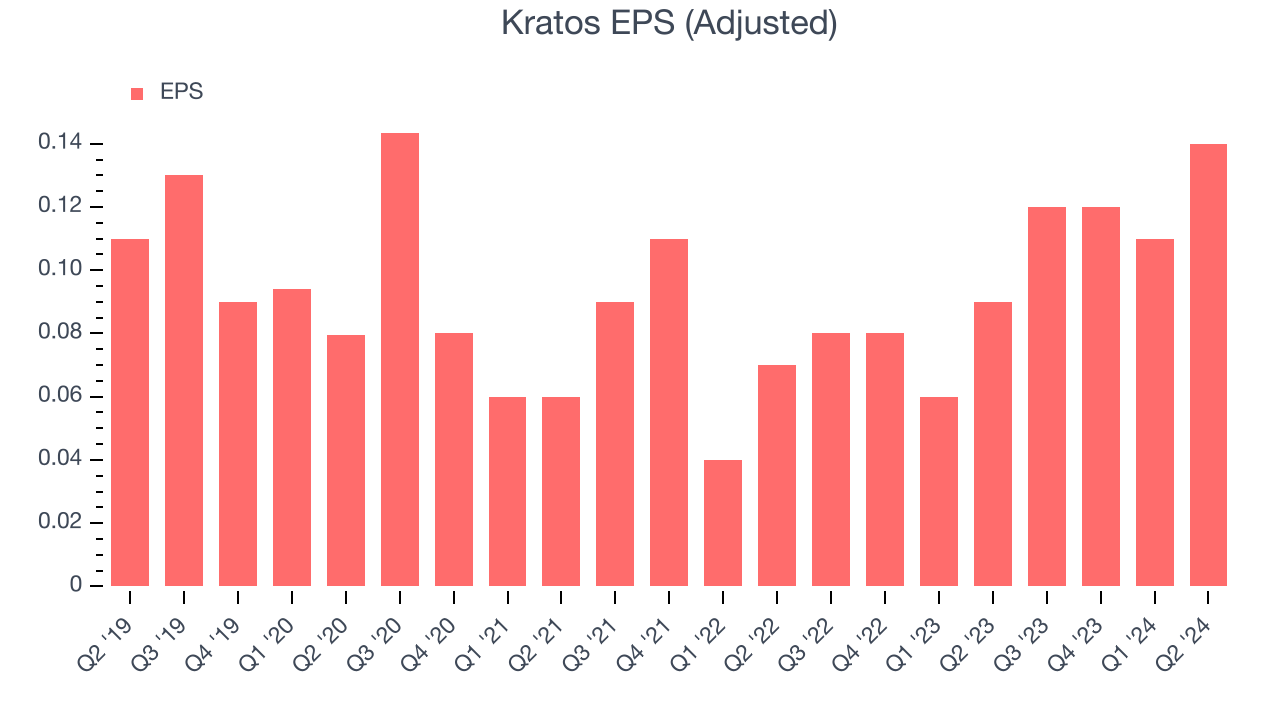
We can take a deeper look into Kratos's earnings to better understand the drivers of its performance. A five-year view shows Kratos has diluted its shareholders, growing its share count by 40.3%. This has led to lower per share earnings. Taxes and interest expenses can also affect EPS but don't tell us as much about a company's fundamentals. 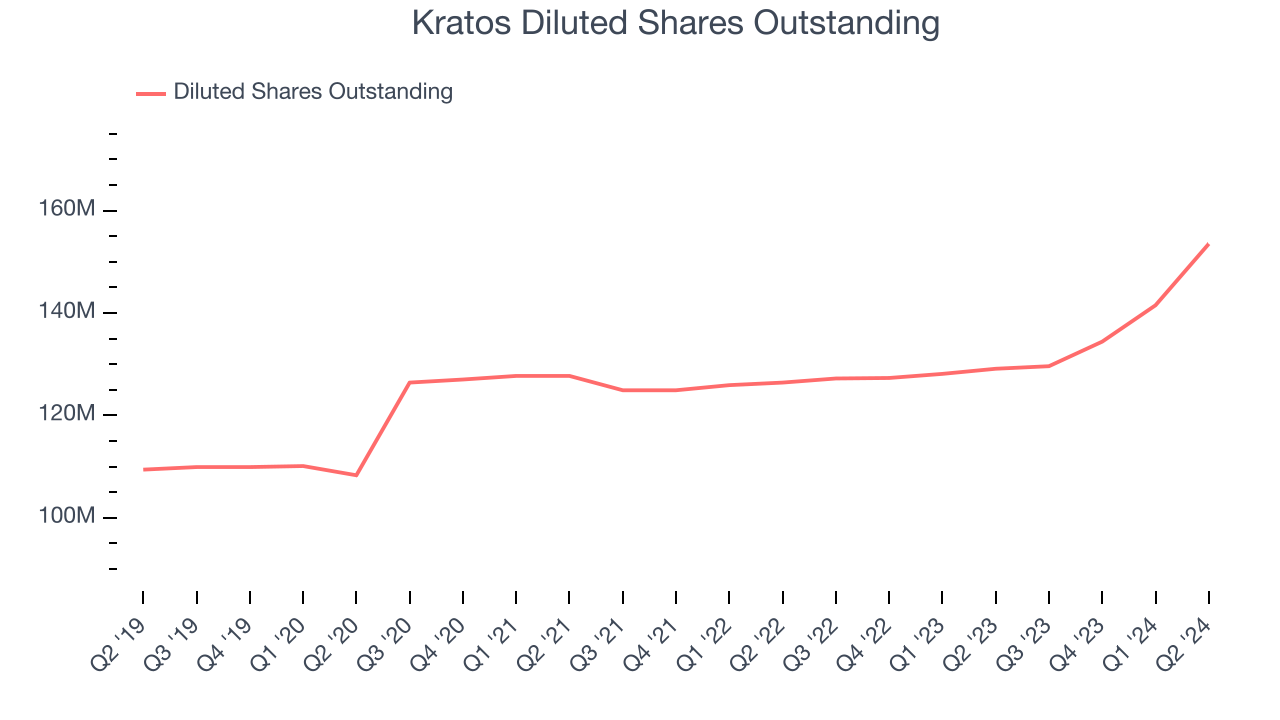
Like with revenue, we also analyze EPS over a more recent period because it can give insight into an emerging theme or development for the business. For Kratos, its two-year annual EPS growth of 25.7% was higher than its five-year trend. This acceleration made it one of the faster-growing industrials companies in recent history.
In Q2, Kratos reported EPS at $0.14, up from $0.09 in the same quarter last year. This print easily cleared analysts' estimates, and shareholders should be content with the results. Over the next 12 months, Wall Street expects Kratos to perform poorly. Analysts are projecting its EPS of $0.49 in the last year to hit $0.47.
Key Takeaways from Kratos's Q2 Results
We were impressed by how significantly Kratos blew past analysts' organic revenue expectations this quarter. We were also excited its EPS outperformed Wall Street's estimates. On the other hand, its revenue guidance for next quarter missed and its full-year revenue guidance slightly fell short of Wall Street's estimates. Overall, this quarter still was mixed but with some key positives. The areas below expectations seem to be driving the stock move, and shares traded down 1% to $19.90 immediately following the results.
So should you invest in Kratos right now? When making that decision, it's important to consider its valuation, business qualities, as well as what has happened in the latest quarter. We cover that in our actionable full research report which you can read here, it's free.
